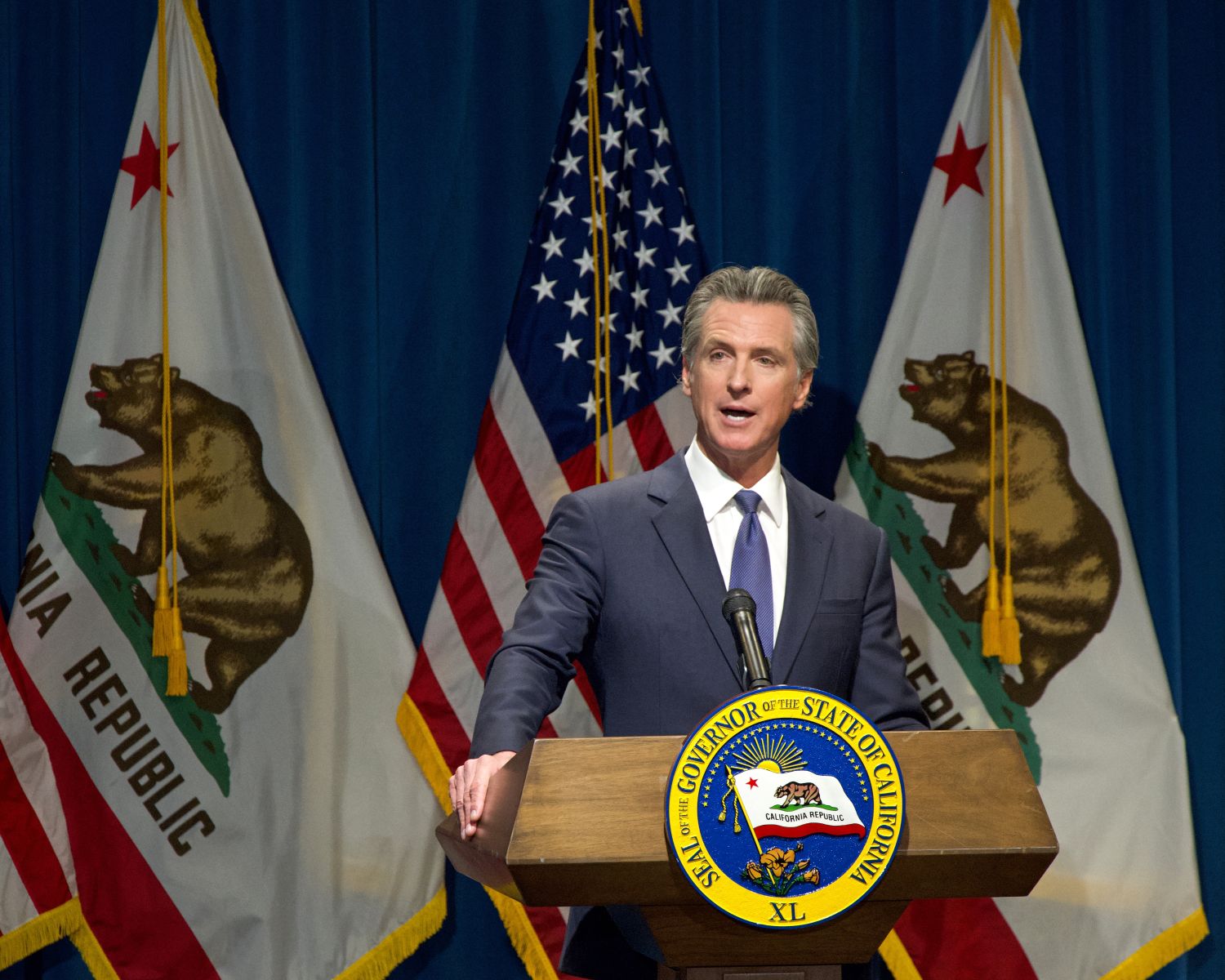
California Governor Gavin Newsom took direct aim at President Donald Trump’s tariff strategy, launching another round of criticism over what he described as “profound uncertainty” in U.S. trade strategy — and citing Nvidia’s (NVDA) anticipated $5.5 billion write-down as the latest high-profile casualty.
The remarks came during a press briefing where Newsom, alongside California Attorney General Rob Bonta, announced the state would sue Trump over his renewed use of tariffs and export controls targeting Chinese technology trade — marking the first state-level legal challenge to the president’s signature economic policy tool.
“What more evidence do you need?” Newsom said, addressing reporters in Sacramento. “Check your 401(k). Check your portfolio. If it includes Nvidia, you should check it right now.”
Nvidia Hit Hard by Export Restrictions
The governor’s comments followed a sharp 7% drop in Nvidia’s shares on Wednesday, after the chipmaker disclosed that it expects to take a $5.5 billion charge in its fiscal first quarter. The loss stems from new U.S. export licensing requirements placed on its H20 AI chips sold to the Chinese market — part of a broader escalation in Washington’s efforts to restrict advanced semiconductor exports to China.
Nvidia, headquartered in Santa Clara, has become a bellwether for the AI and semiconductor industries. The company’s exposure to Chinese demand, particularly in the high-performance computing industry, make it especially vulnerable to new rules requiring federal export licenses. Analysts say the sheer size of the charge suggests that Nvidia does not expect approval for the vast majority of those licenses — essentially cutting off a key revenue stream.
Don't Miss:
- Think it’s too late to invest in the booming AI sector? This one’s still under the radar
- $48.3B in Digital Ad Spend—and Why Investors are Backing This One Little-Known AI Startup
The timing adds a layer of complexity: Nvidia just days earlier announced plans to manufacture AI supercomputers domestically, a move seen by analysts as a strategic olive branch to the Trump administration amid intensifying trade scrutiny.
California Sues Over Tariff Regime
The lawsuit filed by the State of California targets Trump’s latest tariff rounds and export controls on semiconductors and chipmaking tools, arguing that they pose a direct threat to the economic well-being of tech-reliant states like California. Newsom and Bonta framed the lawsuit not only as a policy disagreement but as a defense of one of the state’s most vital industries.
California is home to a significant share of the U.S. semiconductor supply chain, including firms specializing in AI, design software, and hardware manufacturing. State officials argue that aggressive and unpredictable federal trade actions are creating market instability, disincentivizing R&D investment, and endangering jobs in high-growth sectors.
White House Pushback
The Trump campaign swiftly responded. In a statement, White House spokesman Kush Desai criticized Newsom’s lawsuit and priorities. Desai said “Gavin Newsom is spending his time trying to block President Trump’s historic efforts to finally address the national emergency of our country’s persistent goods trade deficits.”
Trump’s administration maintains that trade restrictions are necessary to curb what it sees as overreliance on Chinese manufacturing and to protect U.S. intellectual property. It has framed the chip export controls as a national security imperative.
Market Uncertainty, Investor Anxiety
While geopolitical tensions continue to simmer, markets remain volatile. Nvidia’s sudden valuation loss highlights investor sensitivity to policy developments, especially in the AI and semiconductor sectors. The company’s effort to localize manufacturing — likely a hedge against future export bans — was initially welcomed, but concerns about licensing bottlenecks and retaliatory trade barriers have clouded investor sentiment.
Simultaneously, reports of China expressing a willingness to return to the negotiating table were met with cautious optimism. However, early indications suggest Beijing may impose firm preconditions, making progress anything but certain.
What’s Next
California’s legal challenge injects a new dimension into the trade and tech debate — one where state governments begin to directly push back against federal trade policy in defense of local economic interests. With the AI sector driving significant capital investment and employment across Silicon Valley, the outcome of this dispute could reverberate well beyond Nvidia’s balance sheet.
Whether the courts will side with California remains to be seen. But one thing is clear: The collision between politics, policy, and technology is intensifying — and portfolios are caught in the crossfire.
On the date of publication, Caleb Naysmith did not have (either directly or indirectly) positions in any of the securities mentioned in this article. All information and data in this article is solely for informational purposes. For more information please view the Barchart Disclosure Policy here.






